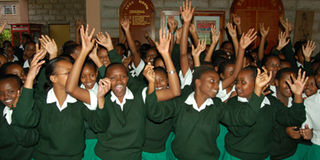Exams council abolishes ranking of schools

Students of Precious Blood Riruta celebrate after learning they had been ranked at position three nationwide in a past exam. There will be no ranking of schools for this year’s examination. Photo/FILE
The national examinations council has abolished the system of ranking schools performance.
This means that candidates starting examinations on Tuesday will not know how their schools faired nationally come the results next year.
This will apply to both the Kenya Certificate of Secondary Education (KCSE) that starts on Tuesday and the Kenya Certificate of Primary Education (KCPE), which starts on November 11.
Mr Paul Wasanga, the Kenya National Examination Council (KNEC) chief executive, said the candidates will also be the first lot to get new result slips that have been modified to reflect the aggregate mean score in addition to the grade.
Also, from this year, the council will publish a list of schools involved in examination cheating in the local dailies.
Teachers, parents and politicians had abused the school rankings as they placed too much emphasis on the position of the school without considering the holistic approach to quality education, he added.
“The ranking also prompts some teachers to engage in examination malpractices with the sole purpose of lifting the standing of their schools.
“Others spend much time drilling students instead of concentrating in covering the syllabus,” he said.
He continued: “Others force weak students to repeat classes so that they would not bring down the mean score.
“There are principals who even poach bright students from other schools to help uplift their school’s mean grade.”
The ranking of schools is usually greeted with jubilation for those placed at the top while those perceived to have underperformed are vilified and condemned.
The schools were being put in categories of the national overall, national schools, provincial district and private.
Until last year, the ranking, which is done by taking the mean grade of all the candidates’ aggregate mean score in a school, was predictable as some institutions always occupied the top spot.
The number one position has for years been the reserve of top schools like Starehe, Alliance, Strathmore and Mang’u.
“Usually the gap in the mean grade of these top performers is negligible but it makes the whole difference as people tend to concentrate on which school has beaten the other,” said Mr Wasanga.
The move to stop ranking may not augur well with school managers especially in private institutions as the practice worked effectively to market them to the parents.
However, said Mr Wasanga, the ranking of top candidates will continue. On the modification of result slips, he said the move was meant to improve clarity on a candidate’s performance.
“Four candidates may get an A but the strength of that grade is not the same. An A ranges from 81 to 84 points and this what we are going to include in result slips.”




